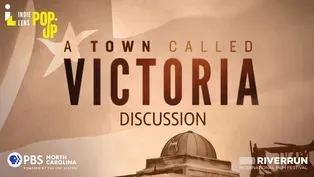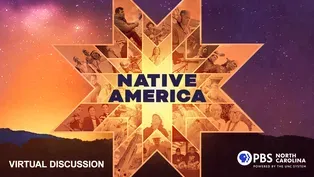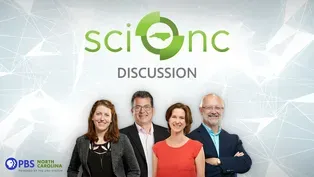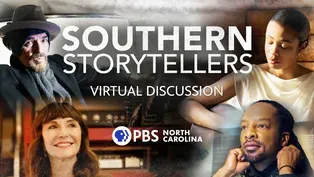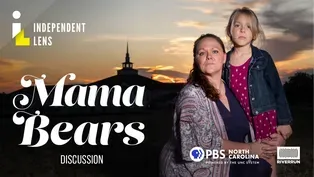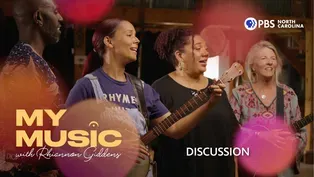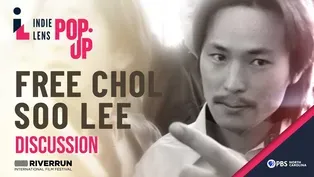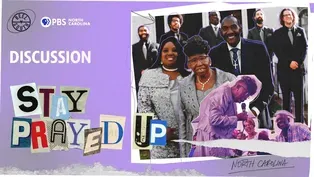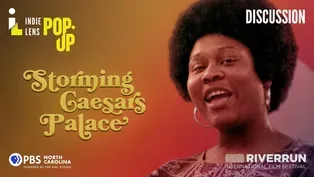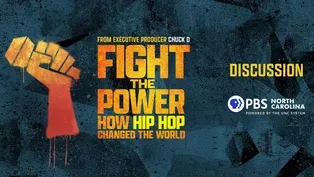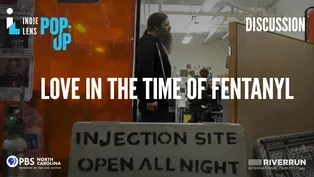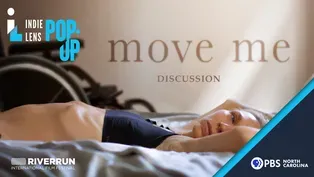PBS North Carolina Specials
Discussion | Ken Burns’ Muhammad Ali
9/13/2021 | 31m 11sVideo has Closed Captions
Local sports media professional and pro boxer discuss Ali’s legacy and more.
PBS NC Chief Growth Officer Susan Scott, retired WRAL sports director Bob Holliday, and Shaw University Alum and former WBA Heavyweight Champ, James “Bonecrusher” Smith discuss Muhammad Ali’s legacy in and out of the ring, the public perception of Ali and today’s athletes, and more.
PBS North Carolina Specials
Discussion | Ken Burns’ Muhammad Ali
9/13/2021 | 31m 11sVideo has Closed Captions
PBS NC Chief Growth Officer Susan Scott, retired WRAL sports director Bob Holliday, and Shaw University Alum and former WBA Heavyweight Champ, James “Bonecrusher” Smith discuss Muhammad Ali’s legacy in and out of the ring, the public perception of Ali and today’s athletes, and more.
How to Watch PBS North Carolina Specials
PBS North Carolina Specials is available to stream on pbs.org and the free PBS App, available on iPhone, Apple TV, Android TV, Android smartphones, Amazon Fire TV, Amazon Fire Tablet, Roku, Samsung Smart TV, and Vizio.
Providing Support for PBS.org
Learn Moreabout PBS online sponsorshipMore from This Collection
Discussion - A Town Called Victoria - Independent Lens
Video has Closed Captions
The filmmaker and former Victoria residents share their story. (46m 51s)
Discussion - Native America Season 2
Video has Closed Captions
Panelists discuss preserving the languages of Native American tribes. (39m 1s)
Video has Closed Captions
Sci NC executive producer and host, Frank Graff, chats about upcoming Season 6 of Sci NC. (26m 6s)
Discussion - Southern Storytellers
Video has Closed Captions
Author David Joy and others discuss storytelling and their new PBS series. (42m 13s)
Discussion - Mama Bears | Independent Lens
Video has Closed Captions
Producer and director Daresha Kyi discusses the film and LGBTQIA+ advocacy. (34m 41s)
Discussion - My Music with Rhiannon Giddens
Video has Closed Captions
Discussing the series with producers Will & Deni McIntyre and country artist Rissi Palmer. (39m 56s)
Discussion - Free Chol Soo Lee | Independent Lens
Video has Closed Captions
Local lawyers, professors and nonprofit leaders discuss wrongful convictions and reentry. (40m 44s)
Discussion - Stay Prayed Up, Reel South
Video has Closed Captions
The filmmakers discuss their journey with Mother Perry and The Branchettes. (45m 4s)
Discussion - Storming Caesars Palace | Independent Lens
Video has Closed Captions
Local professors and nonprofit leaders discuss welfare and the social safety net. (33m 2s)
Discussion - Fight the Power: How Hip Hop Changed the World
Video has Closed Captions
Local experts discuss the history of hip hop with PBS North Carolina. (59m 43s)
Discussion - Love in the Time of Fentanyl | Independent Lens
Video has Closed Captions
Local harm reductionists, therapists and others discuss the opioid crisis and more. (55m 44s)
Discussion | Independent Lens: Move Me
Video has Closed Captions
A dancer with blindness and disability advocates discuss adaptable arts programs. (38m 46s)
Providing Support for PBS.org
Learn Moreabout PBS online sponsorship- Good evening.
Thank you so much for joining us for this special preview screening of Ken Burns "Muhammad Ali".
I am Susan Scott, chief growth officer of PBS North Carolina, your statewide public media network, and one of the nation's largest PBS affiliates.
We are proud to bring you riveting PBS and original content and powerful stories that connect us to our roots in North Carolina, our roots as southerners and our roots as Americans.
As chief growth officer of PBS North Carolina.
My job is to work to make it easy for you to connect with our panelists and their stories in the hopes that you can become passionate about our mission, our content and our initiatives.
Our goal is that this experience will inspire you to act and make a contribution of support to ensure that we continue to bring free events and films like this to you and to all North Carolinians.
So two quick housekeeping items.
To keep the conversation going, we are gathering stories and personal accounts of how Muhammad Ali's legacy has inspired so many.
It's inspired athletes, activists, and frankly, all of us.
So please take a minute to share with PBS North Carolina how Muhammad Ali has impacted your character or inspired you to action.
If you would please visit pbs.org/ali for Ali.
The link can be found in the chat throughout the evening.
There's also going to be a link for an audience survey in the chat.
Yay.
Please take a moment to share your thoughts about the film and about this event.
Everyone who completes a survey and provides their name and email will be eligible to win the Ken Burns "Muhammad Ali" Blu-ray and a Muhammad Ali biography.
So the clips we just saw gave us a small glimpse into the life and career of one of the most indelible figures of the 20th century.
The three-time heavyweight boxing champion, who captivated millions of fans around the world with his lightning speed, his grace and power in the ring and his charm.
And I would say witty boasting.
Muhammad Ali insisted on being unconditionally himself and became an icon and inspiration to people everywhere.
So with that, I would like to welcome our special guests this evening.
I'm very excited about both of them.
I'm thrilled to be joined by Bob Holiday, sports director of RALTV.
He was a reporter and an anchor for 28 years and they tell me he's retired.
I don't get that from him when I talk to him.
And I'm doubly thrilled to bring you James "Bonecrusher" Smith, former heavyweight champ and Shaw University graduate.
I asked him if I needed to call him Mr. Bonecrusher and he said that was not necessary.
So I'd like to thank you both for joining us.
Bob, I I'd like to begin with you.
I've got a first question.
You lived, I think in Louisville.
And I know you admired Muhammad Ali as a young man.
During your sports media career, you had the chance to get up close and personal with him.
What can you share about your experiences with him?
- Let me start with Louisville, Susan, and by the way, good evening.
Great to see you.
Yes.
I lived in Louisville until I was 11.
Louisville had a great amateur boxing program.
And in fact, the film references a weekly TV show on Saturday afternoon that showed amateur boxing in Louisville.
The show was called "Tomorrow's Champions".
And I used to watch that show.
Muhammad was a Golden Gloves champion in Louisville.
And he actually became, I think a two-time national Golden gloves champion.
He represented Louisville and America in the Olympics in the light heavyweight division.
And he won the gold medal.
That was a very proud moment.
I think I was nine years old at the time.
That was a very proud moment for our city.
After winning the gold medal, he turned pro and calmly predicted that he would become the youngest heavyweight champion in history, which he did, winning the title at age 22.
- Yeah.
Yeah.
He was quite something.
He was at least a great prognosticator about his abilities.
Thanks for that.
Bonecrusher, I think I'd like to know from you, you, you know, as a young student athlete back in the day, how did Muhammad Ali inspire you?
The film featured Ali's red bike moment, having his bike stolen and stumbling onto a free gym, offering boxing lessons for children.
What inspired you to take up boxing?
- I grew up on a small farm Magnolia, North Carolina, and my mom and dad motivated me 'cause I didn't want to go to school, but they flipped me and they spanked me and made me go to school.
And those whippings encouraged me to be a fighter and I want to whoop some people.
- I love that.
I don't know whether I want to admit but I know a couple of things about a spanking on the receiving end and I know how motivating that could be.
- Yeah.
And Muhammad came, used to come to North Carolina and he had a lot of Muslim brothers in North Carolina and we'd have some of the same friends and whenever they knew he was coming to town, they'd always call me and we'd get together.
- Yeah, yeah.
That sounds really nice.
For another [indistinct], perhaps you and I can talk about the fact that my family was very close to the Elijah Muhammad family and therefore there, I have my own Muhammad stories.
Not for, not for tonight.
Thank you for that Bonecrusher.
Bob, the media is intended to serve among other things, the public good.
How do you believe the media, specifically sports media, changed the way audiences perceive athletes?
- That's a good question.
Tough question.
I don't know that there's a quick and easy answer.
I think that certainly the coverage that Muhammad Ali received when he made, first of all, made his change to Islam, changed his name.
And then when he took his conscientious objector status to the Vietnam war, I think that challenged media.
These, these, these were things that, that sports stars did not do typically.
And I don't know that the media really knew what to do with it.
I think media coverage evolved, but at the time I think people, the media were not very understanding of somebody who wanted to do things differently.
- Yeah.
I, I think we, I think there's some interesting trends that have continued over the past decades.
Bonecrusher, I think he, he definitely has staying power.
Right.
And he continued and, and has continued relevance to sports and society today.
What's your opinion?
His reputation continues to attract attention.
I think it's mostly positive, but I would acknowledge that there could be some negative.
As a former professional boxer and athlete yourself, why do you think it is that people might still harbor negative feelings about Muhammad Ali?
- I think when he took a stand not to go to Vietnam, I think a lot of folks hold that against him, but it takes a lot of courage to stand up and be a man.
And, you know, he proved that what he was stand up for was really right.
And I think a lot of people, a lot of people, most of the people really appreciate his stand.
And I think that's what made him the hero, that legend that he is today.
- Yeah.
And, and, and how do you think, how do you think that seeing him at the Olympics, how do you think that contributed to the perception of Muhammad Ali.
- And at that stage of his life and his physical ability, even though he was trembling, lagging, carrying the torch and everything I think, but really there again, standing up, being a man and really a lot of, a lot of people I don't think would have gone through that if they were physically conditioned the way he was.
- Yeah.
Yeah.
I definitely understand that.
So Bob, in keeping with that theme of, you know, the role of athletes and the role of media in, in reporting on athletes, some say that Muhammad Ali activated the social consciousness role of the American athlete.
And so many of today's athletes do use their voice for social activism.
Some of those actions are applauded and some are criticized.
As a member of the media.
What trends might you be seeing in public reaction to student athletes now who are starting to recognize the power of their voice and the platforms that are available to them?
Are there any examples that come to mind for you?
- I think after the stormy 2020 summer, where you saw demonstrations in the streets, some of them turned violent.
I think athletes on many campuses, Clemson, NC State, UNC became very active, got involved in their communities, got involved in, in movements and people accepted that.
It was very different Susan, in the '60s.
People did not question when the US went to war.
And when the US went into Vietnam, 95% of Americans or more, looked at that as the same as going into World War II.
You know, the cause was not nearly the same, but it took the country a great deal of time to realize that.
Muhammad Ali was one of the first to realize that this is not a war to save America's, you know, to defend America.
And he said, famously, I don't have nothing against the Viet Cong.
Muhammad Ali took a stand.
Not only did he take a stand, it cost him the prime of his career.
His title was stripped.
He lost his boxing license in many states.
He did not fight in the prime of his life for four or five years.
No one else in the history of sport that I know of has made a stand like that.
And so, yes, athletes today are taking stands.
And I think that's great.
I think having awareness of the world around you.
Being active in your community, those are really good things.
There is life beyond the playing field, but you can't really compare what we're seeing today with the stand of Muhammad Ali.
I don't think there's any really one that, that compares to that.
- Yeah.
Yeah.
I think there are many who think they compare, but they do not.
Bonecrusher, I'd love to ask you, do you likely you do, you know, when you counsel student athletes, you know, they come to you, what are you hearing from them?
Do they ever question you and say, hey, I'm a little torn.
I want to play the sport, but I also see what I perceive as something that might not be right.
How can I go about doing both?
Do you have any of those conversations?
- Yes.
Being a minister, you know, I encourage people, kids and adults as well, to pray and just ask God for direction and God will [indistinct] your spirit, in your heart, your spirit, the right way to go.
- Yeah.
Yeah, yeah.
That's, that's, that's really good feedback.
Let me ask you, let's flip the script just a little bit.
I'm a Carolina alum.
I hope that there are a lot of Carolina alumns who are viewing this, but there are also, you know, Shaw alums, NC Central alumni, NC State alumns, Wake Forest, ECU, et cetera.
Bonecrusher, why are rivalries so important in sports?
- [laughs] That's a tough one.
[laughter] - Well, I'll give you an example.
Maybe it makes it, maybe it makes it a little easier.
How did Muhammad Ali and Joe Frazier's rivalry elevate the sport of boxing, do you think really?
I mean, I think Ali was famous for a whole host of reasons, but, you know, is this a case of that rivalry he needed in the way of rivalries?
Did he need Joe Frazier?
Would Ali have been as famous without that rivalry?
- I don't think so.
And I think Ali had a way to get in a person's head that, you know, he did it with George Foreman.
He did it with Joe Frazier and a lot of them, most of the guys, Ken Norton, he did it, most of the guys that he had fought because I think he was nervous and afraid of those guys.
And once he got into their head, got into their psyche, that was a way of dealing with those guys.
- Honestly, I appreciate you saying that.
I think that is so insightful.
I mean, I think there's no one who's listening that can't relate to having a fear and knowing that they have to overcome it and coming up with either a trope or a practice or something that pumps them up so that they can get through it.
That's that's, that's brilliant.
Listen, I'd like to ask both of you.
There's an audience question.
So I'd love to hear what you both think about this.
Ali called himself the people's champion.
What do each of you think that he meant by that.
- I'll go first.
He had such personality.
One of the thing that I think Bonecrusher is absolutely right about Ali wanting to get into his opponent's head.
One of the ways he did that was through poetry.
One that I can recall.
And when I hit Joe Frazier, he won't even hear the bell.
"And then I'll hop on over the rope and take on Howard Cosell."
He was always doing things like that.
And I think people loved it.
The other thing is he traveled all over the world.
I'll talk a little bit about the press conference he had in Chapel Hill in 1975 that I covered.
He was, he was going to, to see the Shah of Iran.
He was going to see Khadafi in Libya.
He was in fact, here's another poem.
He began the press conference by saying, "Have you heard the news?
I'm going to take on Howard Hughes."
At that point in his career, this was 1975.
And he had just beaten Frazier and his book had just come out.
He really was focused on amassing wealth for the purpose of helping communities, building hospitals, helping the food poverty situation.
So this was a guy who had vision for health, for making the world a better place.
But anyway, he traveled the world.
I mean, his, his flight schedule, the, the frequent flyer miles this guy had were unbelievable.
And so I think when he said that he was the people's champion, and he said in the press conference in 1975, "I'm the most famous person in the world."
He believed that, and I think he was.
Maybe even more famous than Michael Jordan.
Although he came, Michael I think, gave him a run for his money.
- Yeah, I would agree with that.
Bonecrusher, what do you think he meant by calling himself the people's champion?
- You know, I agree with Bob and, and he knew, he knew how to make you laugh.
He told jokes, he had magic tricks.
I mean, you know, and, and he was humble.
And in a lot of ways, I mean, once you got to know him and spent, spent some time with him, he had, he had one show for TV and another, another, a real life story with the people he knew.
- Yeah.
Yeah.
Okay.
We have another audience question.
It reads, Ali is one of a select group of athletes with staying power and continued relevance to sport and society today.
His reputation continues to attract attention, both positive and negative.
Given his relevance, the continued relevance, and this is, this is just a reframing of something that we discussed earlier, but, you know, he is a person people love to talk about and think about.
Why do you think that is?
- There was just so much there.
Again, I don't know of anyone in the history of sport who compiled the kind of on and off the playing field so to speak, dossier that Muhammad Ali compiled.
You know, think about it.
He, he won the championship, was stripped of his title.
He became a conscientious objector, and he needed to earn money.
In fact, he mentioned when he was in Chapel Hill in 1975, that he had started speaking to colleges when he was not, when he wasn't able to fight.
For four years, he had really no income.
And so he started speaking to colleges and of course they had quite a bond because the students in college, in the late '60s and early '70s, they were against the war also.
And so he bonded with them and he spoke to sometimes three, four colleges a week.
He said, but then by '75, UNC was one of his very last stops.
He had kind of changed his focus, said that he had to focus on the elephants and not the ants.
He wanted to focus on amassing wealth and redistributing it.
Just didn't feel like he had time for speeches anymore.
But he really, I think, built a great following in, in my generation with the speeches that he gave on campuses.
And I would also say that while there was a lot of negativity among, you know, the VFW and the American Legion and, and the vets that people changed over time.
My own father was a Naval officer in the Korean War.
And of course he was proud of, you know, Muhammad Ali who was, of course, Cassius Clay when we were living in Louisville.
And my father felt like he should not be fighting while he was having a conscientious objector status.
But once the Supreme Court overturned his, you know, took his, his side, you know, when he won his case at the Supreme Court, my father changed the media, said he served his time.
He should go fight.
I'm all for it.
So I think there are a lot of people like my father who did not like Ali challenging the American military system, but at the same, and nobody did that at that time.
Very few people did ,not say nobody, but very few people did that at that time.
But, but by the time he'd been on the sidelines for five years, they were ready to welcome him with open arms.
And I really feel like the negativity subsided dramatically each year, finally going away completely when we saw him at the Olympics.
That was, even seeing the film I teared up again.
I, I really teared up the night when he got the torch, because everyone else, it was a complete surprise.
You know, it looked like Rafer Johnson, or I'm forgetting the swimmer's name who carried the torch.
But anyway, at the last minute it was handed to Muhammad Ali.
It was a very, very emotional moment.
- Yeah.
It was.
Bonecrusher, how about you?
Do you recall how you felt, where you were, when you saw, when you saw it?
- Yeah, I was saddened because, you know, I knew he had gone through a lot of stuff and, and, but, but I was very excited and impressed by him willing to go through with it, you know, and to do it.
And he did it.
- So let me ask you both this.
What, what, what surprised you about Mohammed Ali at any point in his career?
Whether that was him as a young man or him as he, as he got older.
- The man was full of surprises.
You never knew what he was going to say next, but I did want to follow up on one thing that, that Bonecrusher said.
Muhammad, I remember seeing Muhammad Ali in Fayetteville.
In fact, Bonecrusher, it might've even been at one of your fights.
Muhammad Ali was, was in the gallery, in the crowd.
And during the fight, he went around shaking hands.
He was suffering from Parkinson's.
You could see, you see him trembling.
He didn't speak, but he had this beautiful smile on his face and shook every hand that wanted to shake his hand.
And of course there were a great many.
I thought he carried his condition with great dignity.
- Mm.
Mm hmm.
- Yeah.
Near the end it was very difficult for him.
He did attend a couple of my fights and I was very excited about that.
And, but it was very hard.
It, it got very hard for him near the end, but he kept doing it.
Kept working.
- Yeah.
- Yeah, yeah.
Do you, do you think he gets enough, I don't know if.
he wouldn't be looking for credit, but do you think he gets enough recognition for all of the good that he worked to do for other communities?
- No.
I don't think he gets nearly the recognition.
And that's why, first of all, the fact that he came to Chapel Hill was just a stroke of luck for the UNC community.
There was a young woman in the black student movement who had connections in Chicago.
Ali said that he was the only reason he was there was he was good friends with this young woman's father.
He actually had to turn down a $500,000 deal that came in at the last minute to honor, and that was to do something in Germany.
He turned that down to honor his commitment to come to Chapel Hill.
But the conversation that he had in that press conference, it's really pretty extraordinary.
There was many, one question about boxing.
The Congress, gives it a 30 minute press conference.
And he talked about boxing for maybe 30 seconds.
He said that, you know, that he, he didn't really have that many more mountains to climb at the point, you know, he'd knocked out, he'd beat Joe Frazier.
And, you know, he was getting, getting close to the people in business, and they were advising him to, you know, go make money.
You know, this is your time, you know, you're hot now, go make money.
Of course later we know that he did fight Frazier again, and he did fight George Foreman.
So I don't know how long this phase lasts, but his sense of understanding of the needs of the world was great.
He talked about maybe running for president and how he was gonna, he was gonna get things done, you know, how there are too many politicians who just, who don't take action.
And, you know, won't take a stand on things.
He said, "I'll promise, I'll tell you the truth."
Now I think that maybe reflected a bit of a lack of how the American Congress works, but, you know, he, he had a view of, of helping the world and, and he actually closed the press conference with a beautiful poem about truth.
It was about 60 seconds.
I wish I could quote it, but it was well done.
Very, very bright man, and really had a heart of gold.
- Yeah.
Yeah.
That's thank you for sharing that.
Bonecrusher, what about you?
What, what's your sense of both the work that he did in communities and whether people have a clear grasp of, of that work?
- Yeah, he was a hard worker and he would come to North Carolina many, many times, you know, and, and those times I visit with him he'd sign autographs.
And he just had a lot of time for people.
I mean, he spent a lot of time with his fans, he had a lot, a lot of fans and, you know, I was always excited to be with, to spend time with them.
- Okay.
All right.
Well, I know that we always promise our participants that we will get them out by, by eight.
But I, I'd like to ask you both.
If he, if Muhammad Ali, were sitting here with us today, what would you like to ask him?
- I sure liked to know how he came up with the rope-a-dope.
Trivial, given the context of some of the other things we've been talking about, how he wanted to make the world a better place.
But to me, that was part of the story of Ali.
You know, he gave up the prime of his career.
And so he's really kind of on the downhill side when he comes back to fight in the early '70s and he, he had, Bonecrusher, I think you would agree.
I don't think anybody had better legs that Ali.
Just so, so graceful.
So able to move his legs so quickly.
And that's what, that was a big part of what made him so difficult to beat was trying to catch him.
But as he got a little slower, he came up with this thing called the rope-a-dope.
And in fact, there's something else called the mirage.
I'm going to go after George Farmer with a rope-a-dope and the mirage.
Can't hit - you can't, you can't hit what you can't see.
So I would like to know more about that, but definitely would like to know, you know, maybe how boxing influenced his view of, of wanting to help make the world a better place.
- Yeah.
Yeah.
That's great.
Thanks for sharing that.
Bonecrusher, how about you?
If he's sitting right here, what would you like to ask him?
- Muhammad, did you come up with those ideas to get around your opponents or did that came for someone else?
[laughter] - Gentlemen, I could talk to you for the next hour or so, but I first want to acknowledge our time and want to offer my sincerest thanks to both of you for joining us this evening.
I'd also like to offer many thanks to you, our audience for logging on and for participating in the conversation, plus a special thank you to Shaw University, North Carolina A and T and North Carolina Central for publicizing and spreading the word about this event.
Audience, please don't forget to watch or stream the entire film.
"Muhammad Ali" airs next Sunday, September 19th at 8:00 PM on PBS North Carolina.
And it's going to run through Wednesday, September the 22nd.
Ali is available for streaming at video.pbs.org and on the PBS video app.
So to keep this conversation going, we are gathering stories and personal accounts of how Muhammad Ali's legacy has inspired you.
Athletes, activists, teachers, librarians, all of us.
We would really like to hear your story.
So if you would take a minute to share with PBS North Carolina, how Muhammad Ali, the person, something that he did has impacted your character or inspired you into action.
And you can do that by visiting PBSNC.org/ali, A-L-I.
The link can be found in the chat on our website and in an email that you're going to receive later this week.
But wait, we want a lot from you.
Would you also let us know what you thought of tonight's program?
There is a link for an audience survey in the chat feature.
Please, please.
It helps us so much.
Take a moment to share your thoughts about the film and about this event.
Everyone who completes the survey and provides their name and email will be eligible to win the official Ken Burns "Muhammad Ali" Blu-ray and a Mohammed Ali biography.
And so if you missed any of the info I mentioned, or that we posted in the chat, don't worry.
If you'll check your inbox for an email containing a link to this evening's discussion, a link to share your story and thoughts about Muhammad Ali and then helpful resources and an audience survey.
You can expect that email on Friday.
And finally to continue to make it possible for us, PBS North Carolina, to bring you riveting documentaries, balanced news, informative how-to programs, exciting initiatives, a 24-hour-a-day children's programming channel and free events like this one.
I hope you are inspired to make a tax deductible donation to help us continue doing those things.
That donation simply goes to PBS North Carolina.
And you can do that by visiting our website at PBS North Carolina or PBSnc.org.
Thanks again so much for joining us.
Stay safe and well.
Good night.
- Night.
- Bye.
- Thanks guys.
- Enjoyed it.
- Yeah.
Tons of fun.
Bye bye.
